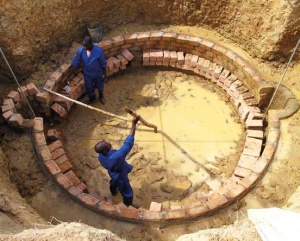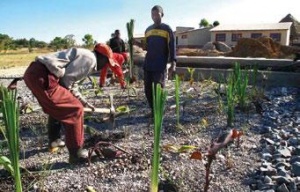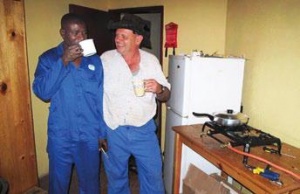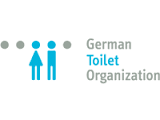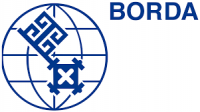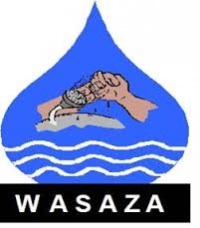Sustainable school sanitation concept - School sanitation story from Zambia
Country: Zambia
Contents
[hide]A growing school requires an adaptable sanitation system
Basic data:
At Pestalozzi Zambia Children’s Trust' school in the frame of the new sanitation concept a decentralized wastewater treatment system and a biogas system were installed. There are
currently 200 boarding students plus 90 day students, but the school has further plans for expanding.
The project and the experiences:
The Pestalozzi Zambia Children’s Trust runs a peri-urban school in Lusaka (Zambia) that has had to continually adapt its sanitation system in recent years as the school has grown from only 80 students in 2004 to more than 220 secondary school students today. First, septic tanks and soak away technologies were installed at the school, but within six months, the school management realized that the septic system was undersized, and the soakaway technology was not working due to the high groundwater table. Jeanette Laramee, project coordinator sharply remembers: “We had a big puddle of wastewater building up near the septic tank.”
The involvement of the German Toilet Organization, the Bremen Overseas Research and Development Association (BORDA) and the Water and Sanitation Association of Zambia (WASAZA) led to the installation of a decentralized wastewater treatment system (DEWATS) including a biogas digester as the primary treatment module at the school. The DEWATS treats both wastewater and organic kitchen waste and thereby generates biogas and produces treated wastewater that is used for irrigation of fruit trees. Secondary treatment is provided by a nine chamber anaerobic baffled reactor (ABR), with tertiary treatment provided by a planted gravel filter (PGF).
Jeanette adds: “I had actually already been looking at ways to separate and reuse the greywater at the school. The DEWATS concept now takes this a big step further by enabling energy reuse through biogas and reuse of both grey- and blackwater. About 15 to 20% of the school’s required energy for cooking is used from the biogas plant which helps us enormously and supports our financial independence.”
A member of the school kitchen staff happily explained the benefits of the new sanitation system: “Before we had to cook with firewood. Now we can at least partly cook with biogas. This causes less impact on the environment. But furthermore it also protects the children’s and my own health which suffered a lot from the open fires we used before.”
Altogether, we estimate that the availability of biogas allows for a reduction of approximately 5,100 kg of firewood per year. This amounts to a savings of over $500 per year for the school, and clearly benefits the environment through a reduction of firewood use and consequent GHG emissions.
With a more complex system than many other schools have, operations and maintenance are also more crucial to the sustainability of the project. Although minimal maintenance has been required in the first five years for the biogas digester and ABR, the planted gravel filter periodically needs to be maintained. After about five years of operation, organic material had accumulated in the stone filter, thus limiting water flow through the PGF. The stones were removed, washed free of organics, and placed back in the PGF. New canna indica, reeds, elephant ear and even banana seedlings were then replanted in the washed stone filter. Additionally, the plants in the filter need to be trimmed and old growth removed to prevent premature blockages in the filter. The benefit of this is that the organic matter can be recycled into the system thus boosting Socially accePtable biogas production. In this manner, a circular system and inStitutionally of waste and resources is created. The biogas stoves additionally need to be maintained periodically to remove blockages resulting from grease and oil, rust, adapted to a dynamic, and small dust particles. WASAZA and BORDA growing school. provide support to Pestalozzi for operations and maintenance issues and also have trained staff at the school so these tasks can be done as much as possible in house.
The system continues to be adapted as continued operation provides greater understanding of the system and as the population of the school continues to grow. Leakages throughout the pre-existing toilets and plumbing have resulted in much greater inflows than expected to the DEWATS system since its installation. So, plumbing improvements have been undertaken recently to reduce flows to the system. In addition, another biogas digester was added to both increase energy production and to increase the wastewater treatment capacity of the system.
The key lessons of the story:
The educational philosophy of the school is “head, heart, and hands,” and Jeannette Laramee notes that, “The system offers a perfect learning opportunity to demonstrate the value and reuse of resources” which can then be communicated across Zambia when the boarding students return to their homes.
Contribution to the SuSanA sustainability criteria
Protect the environment and natural resources: This sanitation system not only protects groundwater from untreated waste but also generates a source of energy for the school to use.
Socially acceptable and institutionally appropriate: The sanitation system is able to grow and be adapted to a dynamic, growing school.
Project details
Project location: Pestalozzi Zambia Children's Trust's school in Lusaka, Zambia
Executors and funders: German Toilet Organization (GTO), Pestalozzi Zambia Children's Trust
Partners: BORDA, WASAZA
GTO (German Toilet Organization) is a non-profit NGO, founded in Berlin in October 2005. The GTO is a network of people, who combine their expertise of various professions, working towards common goals.
Pestalozzi World Children's Trust enable education for disadvantaged children in Asia and Africa - teaching practical skills, technical knowledge and ethics.
BORDA (Bremen Overseas Research & Development Association) is a specialist organization active in the fields of poverty alleviation, sustainable protection of natural resources and the strengthening of social structures.
WASAZA (Water and Sanitation Association of Zambia) was registered on 10 September 1999 under section 7 (1) of the Societies Act. The Association’s main objectives are to provide a forum for the water sector where people from different professional backgrounds in government, private sector and non-governmental organizations can come together and discuss issues affecting the sector and promote best practice generally. WASAZA is open to all professionals in the traditional water sector and in related fields such as environment, agriculture and health. We work with different partners in all fields of engagement from government, public and private areas.
Contact
Robert Gensch
German Toilet Organization
robert.gensch![]() germantoilet.org
germantoilet.org
germantoilet.org
Jeannette Laramee
Pestalozzi Zambia Children‘s Trust
laramee![]() borda-sadc.org
borda-sadc.org
pestalozziworld.com
